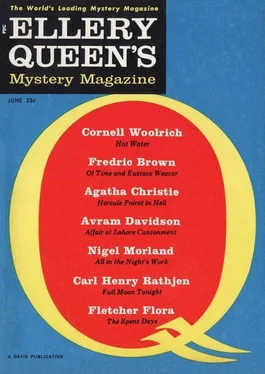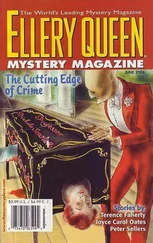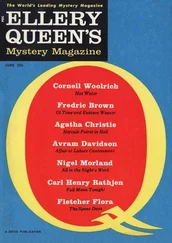Фредерик Браун - Ellery Queen’s Mystery Magazine. Vol. 37, No. 6. Whole No. 211, June 1961
Здесь есть возможность читать онлайн «Фредерик Браун - Ellery Queen’s Mystery Magazine. Vol. 37, No. 6. Whole No. 211, June 1961» весь текст электронной книги совершенно бесплатно (целиком полную версию без сокращений). В некоторых случаях можно слушать аудио, скачать через торрент в формате fb2 и присутствует краткое содержание. Город: New York, Год выпуска: 1961, Издательство: Davis Publications, Жанр: Классический детектив, на английском языке. Описание произведения, (предисловие) а так же отзывы посетителей доступны на портале библиотеки ЛибКат.
- Название:Ellery Queen’s Mystery Magazine. Vol. 37, No. 6. Whole No. 211, June 1961
- Автор:
- Издательство:Davis Publications
- Жанр:
- Год:1961
- Город:New York
- ISBN:нет данных
- Рейтинг книги:5 / 5. Голосов: 1
-
Избранное:Добавить в избранное
- Отзывы:
-
Ваша оценка:
- 100
- 1
- 2
- 3
- 4
- 5
Ellery Queen’s Mystery Magazine. Vol. 37, No. 6. Whole No. 211, June 1961: краткое содержание, описание и аннотация
Предлагаем к чтению аннотацию, описание, краткое содержание или предисловие (зависит от того, что написал сам автор книги «Ellery Queen’s Mystery Magazine. Vol. 37, No. 6. Whole No. 211, June 1961»). Если вы не нашли необходимую информацию о книге — напишите в комментариях, мы постараемся отыскать её.
Ellery Queen’s Mystery Magazine. Vol. 37, No. 6. Whole No. 211, June 1961 — читать онлайн бесплатно полную книгу (весь текст) целиком
Ниже представлен текст книги, разбитый по страницам. Система сохранения места последней прочитанной страницы, позволяет с удобством читать онлайн бесплатно книгу «Ellery Queen’s Mystery Magazine. Vol. 37, No. 6. Whole No. 211, June 1961», без необходимости каждый раз заново искать на чём Вы остановились. Поставьте закладку, и сможете в любой момент перейти на страницу, на которой закончили чтение.
Интервал:
Закладка:
Her voice dropped to a coo as she spoke the last words and she threw the duck bone from her plate to the big black hound who caught it with a ferocious snap of the jaws.
“What is that you call that animal?” asked Poirot.
“C’est mon petit Dou-dou!”
“But it is ridiculous, a name like that!”
“But he is adorable! He is a police dog! He can do anything — anything— Wait!”
She rose, looked round her, and suddenly snatched up a plate with a large succulent steak which had just been deposited before a diner at a nearby table. She crossed to the marble niche and put the plate down in front of the dog, uttering a few words in Russian.
Cerberus gazed in front of him. The steak might not have existed.
“You see? And it is not just a matter of minutes! No. he will remain like that for hours if need be!”
Then she murmured a word and Cerberus bent his long neck and the steak disappeared as though by magic.
Vera Rossakoff flung her arms around the dog’s neck and embraced him passionately, rising on tiptoe to do so.
“See how gentle he can be!” she cried. “For me, for Alice, for his friends — they can do what they like! But one has but to give him the word and presto! I can assure you he would tear a — police inspector, for instance — into little pieces!”
She burst out laughing.
“I would have but to say the word—”
Poirot interrupted hastily. He mistrusted the Countess’s sense of humor. Inspector Stevens might be in real danger.
“Professor Liskard wants to speak to you.”
The Professor was standing reproachfully at her elbow.
“You took my steak,” he complained. “Why did you take my steak? It was a good steak!”
“Thursday night, old man,” said Japp. “That’s when the balloon goes up. It’s Andrews’ pigeon, of course — Narcotic Squad — but he’ll be delighted to have you horn in. No, thanks, I won’t have any of your fancy sirops. I have to take care of my stomach. Is that whiskey I see over there? That’s more the ticket!”
Setting his glass down, he went on, “We’ve solved the problem, I think. There’s another way out of that club — and we’ve found it!”
“Where?”
“Behind the grill. Part of it swings round.”
“But surely you would see—”
“No, old boy. When the raid started, the lights went out — switched off at the main — and it took us a minute or two to get them turned on again. Nobody got out the front way because it was being watched, but it’s clear now that somebody could have nipped out by the secret way with the doings. We’ve been examining the house behind the club — and that’s how we tumbled to the trick.”
“And you proposed to do — what?”
Japp winked. “Let it go according to plan — the police appear, the lights go out — and somebody’s waiting on the other side of that secret door to see who comes through. This time we’ve got ’em!”
“Why Thursday?”
Again Japp winked. “We’ve got the Golconda pretty well taped now. There will be stuff going out of there on Thursday. Lady Carrington’s emeralds.”
“You permit,” said Poirot, “that I, too, make one or two little arrangements?”
Sitting at his usual small table near the entrance on Thursday night, Poirot studied his surroundings.
The Countess was even more flamboyantly made up than usual, very Russian tonight, clapping her hands and screaming with laughter. Paul Varesco had arrived. Sometimes he wore faultless evening dress, sometimes, as tonight, he chose to present himself in a kind of apache get-up, tightly buttoned coat, scarf round the neck. He looked vicious and attractive. Detaching himself from a stout middle-aged woman plastered with diamonds, he leaned over Alice Cunningham, who was sitting at a table writing busily in a little notebook, and asked her to dance. The stout woman scowled at Alice and eyed Varesco adoringly.
There was no adoration in Miss Cunningham’s eyes. They gleamed with pure scientific interest, and Poirot caught fragments of their conversation as they danced past him. She had progressed beyond the nursery governess and was now seeking information about the matron at Paul’s preparatory school.
When the music stopped, she sat down by Poirot, looking happy and excited.
“Most interesting,” she said. “Varesco will be one of the most important cases in my book. The symbolism is unmistakable. Trouble about the vests, for instance — for vest read hair shirt with all its associations — and the whole thing becomes quite plain. He’s a definitely criminal type but a cure can be effected—”
“That she can reform a rake,” said Poirot, “has always been one of woman’s dearest illusions!”
Alice Cunningham looked at him coldly.
“There is nothing personal about this, M. Poirot.”
“There never is,” said Poirot. “It is always pure disinterested altruism — but the object of it is usually an attractive member of the opposite sex. Are you interested, for instance, in where I went to school, or what was the attitude of the matron to me?”
“You are not a criminal type,” said Miss Cunningham.
“Do you know a criminal type when you see one?”
“Certainly I do.”
Professor Liskard joined them He sat down by Poirot.
“Are you talking about criminals? You should study the criminal code of Hammurabi, M. Poirot 1800 b.c. Most interesting. The man who is caught stealing during a fire shall be thrown into the fire.”
He stared pleasurably ahead of him toward the electric grill.
“And there are older, Summerian laws. If a wife hateth her husband and saith unto him ‘Thou are not my husband,’ they shall throw her into the river. Cheaper and easier than the divorce court. But if a husband says that to his wife he only has to pay her a certain measure of silver. Nobody throws him in the river.”
“The same old story,” said Alice Cunningham. “One law for the man and one for the woman.”
“Women, of course, have a greater appreciation of monetary value,” said the Professor thoughtfully. “You know,” he added, “I like this place. I come here most evenings. I don’t have to pay. The Countess arranged that — very nice of her — in consideration of my having advised her about the decorations, she says. Not that they’re anything to do with me really — I’d no idea what she was asking me questions for — and naturally she and the artist have got everything quite wrong. I hope nobody will ever know I had the remotest connection with the dreadful things. I should never live it down. But she’s a wonderful woman — rather like a Babylonian, I always think. The Babylonians were good women of business, you know—”
The Professor’s words were drowned in a sudden chorus. The word “Police” was heard — women rose to their feet and there was a babel of sound. The lights went out and so did the electric grill.
As an undertone to the turmoil, the Professor’s voice went on tranquilly reciting various excerpts from the laws of Hammurabi.
When the lights went on again, Hercule Poirot was halfway up the wide, shallow steps. The police officers by the door saluted him, and he passed out into the street and strolled to the corner. Just around the corner, pressed against the wall, was a small man with a red nose. He spoke in an anxious, husky whisper.
“I’m ’ere, guv’nor. Time for me to do my stuff?”
“Yes. Go on.”
“There’s an awful lot of coppers about!”
“That is all right. They’ve been told about you.”
“I ’ope they won’t interfere, that’s all?”
“They will not interfere. You’re sure you can accomplish what you have set out to do? The animal in question is both large and fierce.”
Читать дальшеИнтервал:
Закладка:
Похожие книги на «Ellery Queen’s Mystery Magazine. Vol. 37, No. 6. Whole No. 211, June 1961»
Представляем Вашему вниманию похожие книги на «Ellery Queen’s Mystery Magazine. Vol. 37, No. 6. Whole No. 211, June 1961» списком для выбора. Мы отобрали схожую по названию и смыслу литературу в надежде предоставить читателям больше вариантов отыскать новые, интересные, ещё непрочитанные произведения.
Обсуждение, отзывы о книге «Ellery Queen’s Mystery Magazine. Vol. 37, No. 6. Whole No. 211, June 1961» и просто собственные мнения читателей. Оставьте ваши комментарии, напишите, что Вы думаете о произведении, его смысле или главных героях. Укажите что конкретно понравилось, а что нет, и почему Вы так считаете.












